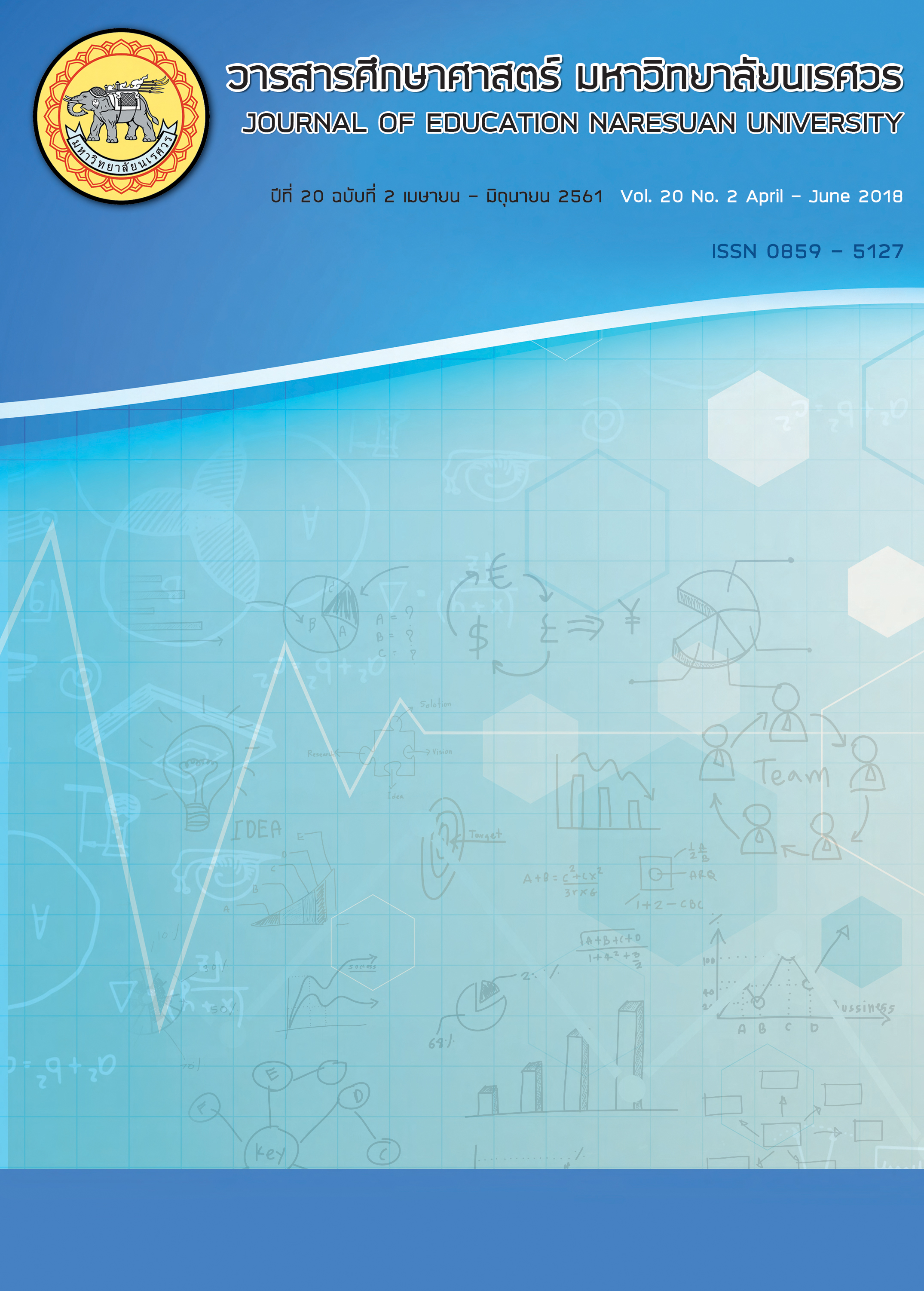การศึกษาผลสัมฤทธิ์ทางการเรียน มโนทัศน์ทางวิทยาศาสตร์ และเจตคติต่อวิชาชีววิทยา เรื่อง โครงสร้างและหน้าที่ของพืชดอก สำหรับนักเรียนชั้นมัธยมศึกษาปีที่ 5 โดยใช้การจัดการเรียนรู้ตามแนวทฤษฏีคอนสตรัคติวิซึม; A STUDY OF LEARNING ACHIEVEMENT, SCIENCE CONCEPTS...
Main Article Content
Abstract
การวิจัยครั้งนี้มีวัตถุประสงค์เพื่อศึกษาผลสัมฤทธิ์ทางการเรียน มโนทัศน์ทางวิทยาศาสตร์และเจตคติต่อวิชาชีววิทยา โดยใช้การจัดการเรียนรู้ตามแนวทฤษฏีคอนสตรัคติวิซึม กลุ่มตัวอย่างที่ใช้ในการวิจัยครั้งนี้ ได้แก่ นักเรียนชั้นมัธยมศึกษาปีที่ 5 โรงเรียนสาธิต “พิบูลบำเพ็ญ” มหาวิทยาลัยบูรพา ภาคเรียนที่ 2 ปีการศึกษา 2558 จำนวน 1 ห้องเรียน มีนักเรียน 33 คน ได้มาจากการสุ่มแบบกลุ่ม เครื่องมือที่ใช้ในการวิจัย ได้แก่ 1) แผนการจัดการเรียนรู้ตามแนวทฤษฏีคอนสตรัคติวิซึม 2) แบบทดสอบวัดผลสัมฤทธิ์ทางการเรียน 3) แบบทดสอบวัดมโนทัศน์ทางวิทยาศาสตร์ และ 4) แบบวัดเจตคติต่อวิชาชีววิทยา สถิติที่ใช้ในการวิจัย ได้แก่ ค่าเฉลี่ย ค่าเบี่ยงเบนมาตรฐาน การทดสอบค่าที (t-test) และการเทียบเกณฑ์ร้อยละ 70
ผลการวิจัย พบว่า
1. ผลสัมฤทธิ์ทางการเรียนของผู้เรียนหลังได้รับการจัดการเรียนรู้ตามแนวทฤษฏีคอนสตรัคติวิซึม วิชาชีววิทยา เรื่อง โครงสร้างและหน้าที่ของพืชดอก สูงกว่าก่อนเรียน และสูงกว่าเกณฑ์ที่กำหนด อย่างมีนัยสำคัญทางสถิติที่ระดับ .05
2. มโนทัศน์ทางวิทยาศาสตร์ของผู้เรียนหลังได้รับการจัดการเรียนรู้ตามแนวทฤษฏีคอนสตรัคติวิซึม วิชาชีววิทยา เรื่อง โครงสร้างและหน้าที่ของพืชดอก สูงกว่าก่อนเรียน และสูงกว่าเกณฑ์ที่กำหนด อย่างมีนัยสำคัญทางสถิติที่ระดับ .05
3. เจตคติต่อวิชาของผู้เรียนหลังได้รับการจัดการเรียนรู้ตามแนวทฤษฏีคอนสตรัคติวิซึม วิชาชีววิทยา เรื่อง โครงสร้างและหน้าที่ของพืชดอก สูงกว่าก่อนเรียนอย่างมีนัยสำคัญทางสถิติที่ระดับ .05
A STUDY OF LEARNING ACHIEVEMENT, SCIENCE CONCEPTS AND ATTITUDE TOWARDS BIOLOGY ON THE TOPIC OF STRUCTURE AND FLOWERING PLANTS OF MATTHAYOMSUKSA 5 STUDENTS THROUGH CONSTRUCTIVISM THEORY
The purposes of this research were to study of learning achievement, science concepts and attitude towards biology using Constructivism. The samples for this research consisted of 33 of Matthayomsuksa 5 students from Piboonbumpen Demonstration School, Burapha University, Chonburi Province in the second semester of academic year 2015. They were randomly selected by using the cluster random technique. The research instruments included biology lesson plans by using the Constructivism in the topic of Structure and flowering plants, a biology achievement test, science concepts and an attitude towards biology test. The data were statistically analyzed by using average, standard deviation, t-test and criterion of 70 percent. The research were found that
1. The biology learning achievement through Constructivism was significantly higher than those before learning and was significantly higher than criterion 70% (p < .05).
2. The science concept through Constructivism was significantly higher than those before learning and was significantly higher than criterion 70% (p < .05).
3. The attitude towards biology after learning through Constructivism on the topic of structure and flowering plants was significantly higher than those before learning (p < .05).
Article Details
The owner of the article does not copy or violate any of its copyright. If any copyright infringement occurs or prosecution, in any case, the Editorial Board is not involved in all the rights to the owner of the article to be performed.
References
Chumnumduang, O. (2007). Comparisons of outcomes of biology learning entitled the inheritance of hereditary characteristics of Mathayomsuksa 4 students who received the constructivism teaching approach and those who received the traditional teaching approach (Master thesis). Maha Sarakham: Mahasarakham University. (in Thai)
Liengjaroonrat, S. (2000). Effects of constructivism learning process and portfolio on teaching energy and life, and home electrical appliances in Mathayomsuksa 3 Kasetsart University laboratory school (Doctoral dissertation). Bangkok: Kasetsart University.
(in Thai)
Ministry of Education. (2008). The Basic Education Core Curriculum B.E. 2551 (A.D. 2008). Bangkok: The Agricultural Cooperative Federation of Thailand. (in Thai)
Pattiyathani, S. (2006). Educational measurement (5th ed.). Kalasin: Prasan Printing. (in Thai)
Plodkaew, K. (2008). The development of web-based instruction by constructionism theory on electronic book construction for Mathayomsuksa 1 students. SWU eJournals, 9(1), 52-57. (in Thai)
Poonpipat, W. (2013). Effects of instruction based on the constructivist approach with multiple scientific representations of concepts on matter and properties and analyzing the ability of lower secondary school students (Master thesis). Bangkok: Chulalongkorn University. (in Thai)
Sailabath, J. (2012). An integrated curriculum development for Prathomsuksa V students by constructionism theory: a case study of Bankhaohin School. Journal of Educational Administration Burapha University, 7(1), 79-90. (in Thai)
Saiyod, L., & Saiyod, A. (1995). Measurement and evaluation learning techniques. Bangkok: Suweeriyasarn. (in Thai)
Saiyod, L., & Saiyod, A. (2000). Measurement techniques. Bangkok: Suweeriyasarn. (in Thai)
Singlop, S. (2012). The development of integrated curriculum for Mathayomsuksa II students on “human body system” emphasized on constructionism (Doctoral dissertation). Chonburi: Burapha University. (in Thai)
Srisa-ard, O. (2003). Educational measurement course materials. Maha Sarakham: Mahasarakham University. (in Thai)
Taweerat, P. (2000). Research methodology in behavioral sciences and social sciences (7th ed.). Bangkok: Educational and Psychological Test Bureau, Srinakharinwirot University. (in Thai)
Tosukolvan, V. (2013). The development of practicals using constructivist learning approach in the topic of structures and functions of flowering plants for senior secondary students (Master thesis). Bangkok: Srinakharinwirot University. (in Thai)


